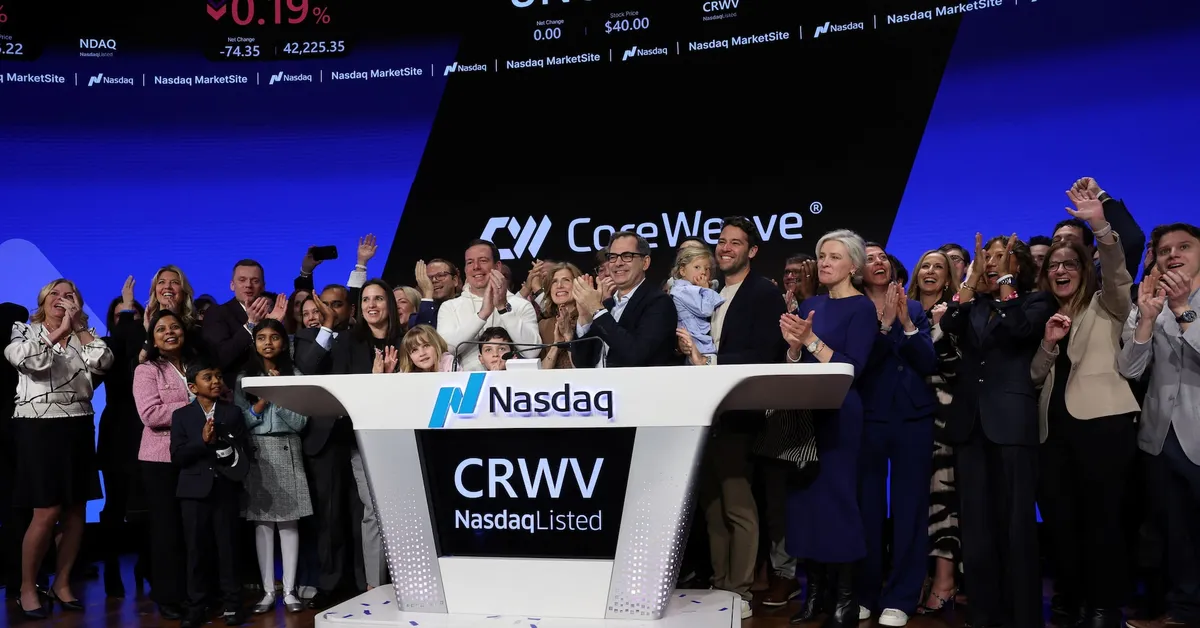
The recent IPO performance of CoreWeave has sparked significant concerns about the future of initial public offerings, particularly in the technology sector. As equity markets continue to navigate through tariff-related turmoil, the weak debut of CoreWeave's stock, which opened at $39—below its IPO price of $40—could stifle hopes for a robust recovery in IPOs. This situation is compounded by growing uncertainty surrounding AI infrastructure investments amid fears of competition from more cost-effective alternatives, notably from China's AI startup DeepSeek.
CoreWeave's initial public offering faced challenges even before its launch, having to downsize its offering significantly. Kamran Ansari, managing partner at Kapital Ventures, expressed skepticism about market receptivity, stating, "I don't know how receptive the market's going to be." Despite the company's meteoric growth trajectory, Ansari pointed out that its long-term sustainability remains unproven. Nevertheless, the IPO still stands as the largest AI-related listing by amount raised, according to Dealogic, which has tracked IPO data since 1995.
During its roadshow, CoreWeave raised alarms among risk-averse investors regarding financial risks and capital intensity in the current volatile market. CoreWeave CEO Mike Intrator emphasized the importance of infrastructure in the AI sector, noting, "The infrastructure that you need to build and deliver artificial intelligence is one of the true super cycles that exist." He highlighted that demand for AI infrastructure has not diminished, even as the complexities of the market evolve.
Based in Livingston, New Jersey, CoreWeave offers access to data centers and high-powered Nvidia chips, critical resources in the race to develop AI applications. However, a worrying statistic reveals that 77% of CoreWeave's revenue last year was generated from just two clients, including tech giant Microsoft. This heavy reliance on a couple of clients has raised concerns about the company's stability, particularly as Microsoft’s AI data center strategy continues to evolve.
In response to these concerns, Intrator stated, "The OpenAI contract materially decreases the single client concentration, and we'll continue to do that over the next several years." Just ahead of the IPO, CoreWeave secured a significant five-year contract valued at $11.9 billion with OpenAI, positioning itself alongside one of the industry's most influential players. CoreWeave executives also assured investors that their existing contracts with Microsoft remain intact, with no commitments canceled or withdrawn.
Founded in 2017 as an Ethereum-focused crypto miner, CoreWeave made a strategic pivot to the AI sector a few years later. The company ceased its mining operations following Ethereum's The Merge in 2022, which significantly reduced rewards for miners. Since then, CoreWeave's revenue growth has been astonishing, increasing more than eight-fold last year. As of last year, the company reported around $8 billion in debt, revealing plans to allocate approximately $1 billion of the IPO proceeds to debt repayment.
Additionally, CoreWeave operates a leasing model for its 32 data centers and certain equipment, resulting in operating lease liabilities totaling $2.6 billion. The IPO was underwritten by a consortium of 18 banks, led by major financial institutions including Morgan Stanley, JPMorgan, and Goldman Sachs.
The mixed performance of CoreWeave's IPO raises critical questions about the future of AI investment and the overall market environment for technology companies. As investors weigh the implications of heavy client dependency and evolving market dynamics, CoreWeave's journey from a crypto miner to a key player in the AI landscape will be closely watched. The company's ability to navigate these challenges will be vital in determining its long-term success and sustainability in the competitive AI sector.